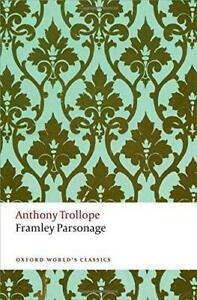I'm grateful I've been reading Trollope's Barsetshire series in order because – although the central protagonists of this fourth book “Framley Parsonage” are new – there are a host of familiar characters in the background who are also integrally involved in some of the novel's side plots. Though I'm sure readers unfamiliar with the previous books would still enjoy this novel the experience is greatly enhanced by a knowledge of these established characters. It's a wonderful pleasure to again meet the domineering Mrs Proudie with her weak-willed bishop husband who were first introduced in “Barchester Towers” and confident, clever Miss Dunstable who we first met in “Doctor Thorne”. In this new novel we even get a new generation as Griselda, the eldest daughter of Dr Grantly and Susan Grantly (who we first met in “The Warden”), is now looking to marry and there are a couple of suitors in contention. In fact, there a number of marriage plots in this new novel which all spin in the wings amidst the book's central story of Mark Robarts, a young vicar who gets drawn into the glamorous lives of the county's aristocracy and unfairly burdened by a debt attached to the cunning Nathaniel Sowerby. Mark's patroness Lady Lufton is deeply saddened by how he's seduced into this faction of the upper class and she serves as a fantastically intimidating foil to the set of characters that revolve around the Duke of Omnium.
Like a soap opera, the book is perhaps a little overburdened with plot lines as there are also the stories of Harold Smith's short-lived time as a cabinet minister and Mr Crawley, an impoverished clergyman who needs assistance as his wife is stricken with typhus. It makes sense that Trollope had so much going on since this novel was written in serial form for a magazine edited by William Thackeray. However, for the most part, the abundance of story lines balance well and come together to present a fantastically entertaining and compelling portrait of a community. It's a tale rich in themes surrounding ambition, money and marriage. As always, Trollope's characters are so dynamic that even more “villainous” figures such as Mr Sowerby are presented in a semi-compassionate way. But that doesn't stop the author poking fun at the foibles of several characters and playing them against each other. Nor is the author an invisible puppet master working in the background as what really makes Trollope's novels rise above typical stories of scandal and romance is the way the narrator frequently intervenes to converse with the reader on the issues at stake, the choices the characters make and the nature of society.
One of my favourite scenes is when the characters indulge in a social fad which they label a “conversazione”. Though it's really just a party with a pretentious name it's hilarious how it leads to discussions about what should and shouldn't be allowed to occur at a “conversazione”. There are several interactions which occur at this party concerning certain characters' marriage prospects. It also culminates in a confrontation between the novel's two most politically opposed characters Lady Lufton and the Duke of Omnium. As I know from reading “Barchester Towers”, Trollope writes truly captivating and uproarious party scenes. But he also beautifully describes moments of great tenderness such a discussion concerning the nature of grief between Mark's sister Lucy and Lady Lufton's son Ludovic. I also adored the dynamic between Mark and his loving wife Fanny who must not only serve as an intermediary between Mark and Lady Lufton but loyally stands by Mark when the debt collectors come knocking at their door.
Though Trollope doesn't often create much dramatic tension concerning the conclusions of his plots, I was surprised by the fate of Miss Dunstable in this novel. I despaired for her having to fend off yet another scheming suitor intent on marrying her for her money and I love how she relishes “ridiculing the world's humbugs.” So it was satisfying to see her finding comfort and happiness in this story. Certainly, there are some uncomfortably telling moments about the attitudes and values of mid-19th century society from the way certain characters refer to Jewish people or some characters describe their colonialist plans to “civilize an island in the South Pacific”. Yet, there are also many wonderful scenes and keen observations Trollope makes that his books continues to be an absolute delight to read and I'm looking forward to the next two books in the Chronicles of Barsetshire.








